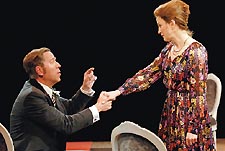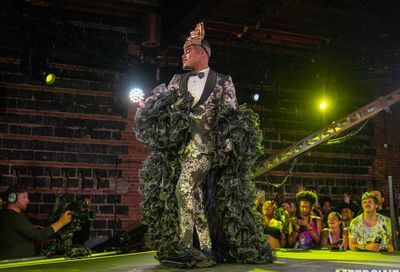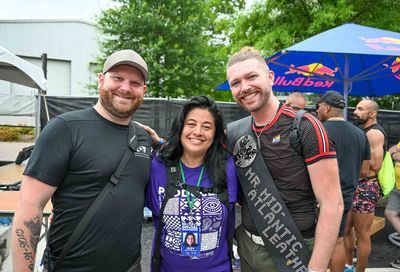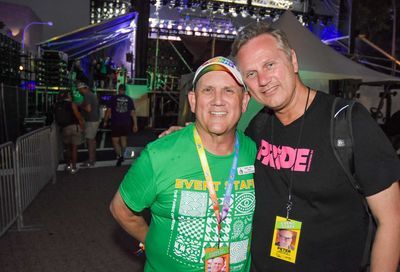Chronic Heidi
Time marches on, yet Arena's new production of Wendy Wasserstein's famed 'Heidi Chronicles' simply doesn't keep up
Well, the pressure is on. With Arena Stage reviving The Heidi Chronicles, the seminal and much lauded play of cultural icon Wendy Wasserstein, ”in loving tribute” (Ms. Wasserstein died in 2006), who would possibly want to be a fly in the ointment? But wouldn’t it be worse to let people spend their hard-earned time and money on what can only be described as an absolute toe-curler?
Not only has this award-winning play, if you’ll pardon the sexist metaphor, not aged well, Arena has fully failed to do it any kind of justice. Even figuring out where the problems of the play merge with the problems with the production is a challenge.
 Girl, interrupted: Lodge and Karas (Photo by Scott Suchman) |
We meet Heidi at a high-school dance in the ’50s and follow her through a series of vignettes spanning the decades until the late ’80s. She is largely of the generation that broke the glass ceiling and, like many of her sisters, seems to have been caught in the falling shards. It is her emotional stumbles and her supposed commitment to her career that we are meant to share over these many years. Though it must have been quite powerful to watch when new and original, now, unfortunately, Wasserstein’s broad-brush characters and skit-like approach simply don’t work.
There are just too many pieces missing from Heidi’s story. We leap from climax to climax (the emotional kind) with nary a thought in between. A prime example comes early on when Heidi tantrums over her gay friend Peter Patrone’s ”failure” to be in love with her; we’ve had no emotional build-up to the scene whatsoever. Then we are supposed to understand her tragic, long-term attraction for the under-realized stock bastard Scoop Rosenbaum, but we see only their first incredibly unfunny, unwitty, unsexy meeting. We are expected to ride on this for decades (as Rosenbaum comes and goes) as some kind of primal event, but it don’t have wheels. We are asked to see massive quantities of pathos in Heidi’s groundbreaking career path, yet for all the talk of her achievements (supplied with heavy-handed detail by supporting characters) and her complaints, Heidi never tells us what is going on in her head.
Her only genuine monologue — in which she bemoans her bag falling open at an all-women gym — ends with the cri de coeur, ”I was committed…. I thought we were all in this together!” This is a sound-bite, a catchphrase, something Wasserstein must have truly wanted to get in — but it has nothing to do with the character of Heidi, who is never shown to connect to either people or ideologies. She just expects the world to come to her. What should have been perhaps the biggest emotional moment is utterly empty.
Ellen Karas plays Heidi as the most unsympathetic woman possible. She alternates (at lightening speed) between Dorothy-in-Oz bewilderment and the smug Boomer defiance embraced so tightly by many of Wasserstein’s generation today (see Hilary/Pelosi). This Heidi speaks to a very specific kind of American woman with a very specific attitude of entitlement. Karas never finds the heart.
| The Heidi Chronicles To May 13 Arena Stage 6th& Maine Ave. SW $53-$67 202-488-3300 www.arenastage.org |
Though she is supported by an ensemble of solid actors, none can make Heidi human. Wynn Harmon plays Patrone with a certain integrity but he and Karas simply don’t connect. Their friendship is one long Will & Grace through the ages — hackneyed hooks with seat-squirmingly bad humor. Yes, Heidi came first, but that alone, without two actors really connecting and emoting with honesty, just isn’t enough.
Marty Lodge gives Scoop Rosenbaum a certain charisma but it all falls flat for the obvious reason of who in their right mind would ever be attracted to the sanctimonious Heidi? Scoop’s eventual wife, played by Hope Lambert as an absurd Southern ”cookie-baker,” actually looks good in comparison to Karas’ lemon-sucker.
The rest of the ensemble tries mightily but it is often confusing whether they are playing new characters or older versions of earlier people. Many of the group scenes have the wearing effect of hideously drawn-out, bad sitcom moments. Still, it is not all Wasserstein’s fault that so much of her material has been drawn on again and again for better or worse, but it was director Tazewell Thompson’s job to make it fresh. What we have instead is a limited period piece, full of cultural references for the select few, but with nothing to say to today’s women who still (sadly) grapple with many of Heidi’s issues.
Support Metro Weekly’s Journalism
These are challenging times for news organizations. And yet it’s crucial we stay active and provide vital resources and information to both our local readers and the world. So won’t you please take a moment and consider supporting Metro Weekly with a membership? For as little as $5 a month, you can help ensure Metro Weekly magazine and MetroWeekly.com remain free, viable resources as we provide the best, most diverse, culturally-resonant LGBTQ coverage in both the D.C. region and around the world. Memberships come with exclusive perks and discounts, your own personal digital delivery of each week’s magazine (and an archive), access to our Member's Lounge when it launches this fall, and exclusive members-only items like Metro Weekly Membership Mugs and Tote Bags! Check out all our membership levels here and please join us today!

























